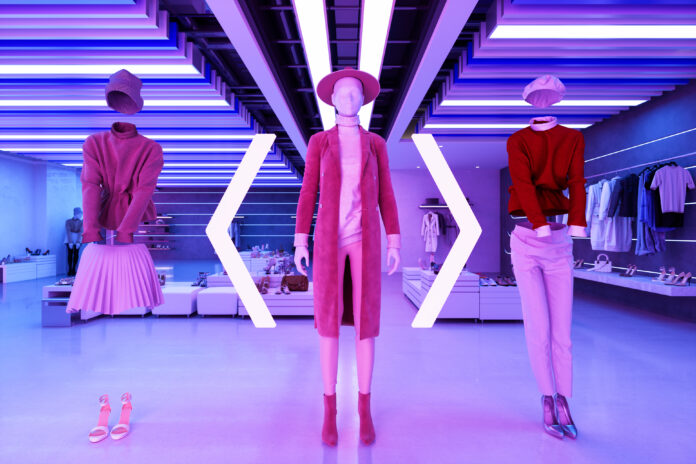
In the bustling world of fashion, stylist Opé M found herself intrigued by the potential of AI technology, specifically generative AI and the metaverse, to elevate her career. Her journey from fashion stylist to designer unfolded as she harnessed the power of GenAI tools, enabling her to reimagine her role and transform her fashion illustration techniques.
Opé initiated her experimentation with OpenAI’s generative AI image creation system, Dall-E, and later transitioned to Midjourney, another generative AI imaging platform. Confidence in her AI-generated designs propelled her to participate in the AI Fashion Week competition in New York in April. Collaborating with clothing brand Revolve, Opé secured third place, with her designs swiftly selling out on the Revolve website.
While Opé garnered success, she faced criticism from those skeptical of AI’s role in design, with some artists accusing generative AI technologies of appropriating their work. Opé, however, views AI as an assistant rather than a replacement for her job or the jobs of fellow fashion designers.
“AI is a servant; it’s a helper, and it can include more people in the process. It can help us communicate faster,” Opé emphasized.
Generative AI is making waves not only in fashion design but also in skincare. Perfect Corp., a leading AI and augmented reality (AR) vendor, showcased an interactive virtual try-on booth at a conference. Their technology, combining AI and AR, allows users to analyze their skin or experiment with various beauty products in a virtual environment.
Wayne Liu, Chief Growth Officer and President of the Americas at Perfect Corp., highlighted AgileFace technology’s precision in analyzing a customer’s face and ensuring realistic depictions of products during virtual try-ons. Perfect Corp. collaborates with beauty companies such as Estée Lauder and Tresemmé, offering users the ability to try on makeup and experiment with different hairstyles.
Revea, another skincare company, employs AI to revolutionize beauty. Users take a skin assessment quiz using their phones, and Revea’s patented face scan technology analyzes the user’s face to create custom skincare formulations. Founder and CEO Chaz Giles explained that Revea employs advanced technologies, including spatial frequency domain imaging, neural networks, and specialized imaging cameras, to delve beneath the skin’s surface and address underlying causes of skin problems.
As AI continues to evolve, experts foresee its profound impact on industries like fashion and skincare. Opé M believes that AI’s improving communication capabilities will revolutionize individualized communication tailored to each person. The integration of AI in fashion and skincare demonstrates its potential as a transformative force, opening new possibilities for creativity, design, and personalized experiences.
While AI has made historical waves in the fashion industry, generative AI is expected to increase revenue by roughly $150 billion over the next 3-5 years, according to McKinsey & Company.
The Future Landscape: AI’s Uncharted Territories
As Opé M and other pioneers navigate the intersections of technology, fashion, and skincare, the trajectory of AI’s influence on these industries remains an open narrative, shaping the future in unprecedented ways.
Redefining Communication in Fashion
Opé M’s success story is emblematic of the evolving relationship between AI and creativity in the fashion realm. While facing skepticism and criticism, she sees AI as a collaborative partner, enhancing the creative process rather than overshadowing it. The ability of generative AI to transform ideas into tangible designs opens new possibilities for designers and stylists, fostering a symbiotic relationship between human intuition and machine precision.
The debate surrounding AI’s impact on artistic originality persists, with some artists expressing concerns about the technology’s potential infringement on their creative space. Opé M’s perspective, however, offers a nuanced understanding — AI as a tool to amplify and expand creative expression, not as a threat to artistic authenticity.
Virtual Try-Ons: A Glimpse into Skincare’s Future
Perfect Corp.’s interactive virtual try-on booth exemplifies how AI is not only revolutionizing fashion but also reshaping the skincare industry. The fusion of AI and AR provides consumers with an immersive experience, allowing them to analyze their skin and experiment with beauty products in a virtual space. This transformative technology extends beyond traditional boundaries, offering skincare enthusiasts a personalized and innovative way to explore beauty solutions.
The success of Perfect Corp.’s partnerships with beauty giants like Estée Lauder underscores the growing acceptance of AI-driven virtual try-ons. As consumers increasingly seek personalized experiences, AI emerges as a valuable tool, helping individuals make informed decisions about skincare products tailored to their unique needs.
Revea’s Technological Marvels
Revea’s approach to skincare exemplifies the marriage of advanced technology and beauty. By combining spatial frequency domain imaging, neural networks, and specialized imaging cameras, Revea delves into the biological intricacies beneath the skin’s surface. The integration of AI in Revea’s skincare assessments not only captures dermatological measurements but also addresses the root causes of skin issues.
Chaz Giles, Revea’s founder and CEO, envisions AI’s continuous evolution in the industry. As AI models improve in sophistication, communication becomes more tailored to individual preferences, ushering in a new era of personalized skincare solutions.
Anticipating the Uncharted
As the realms of fashion and skincare embrace AI, the unfolding narrative presents both opportunities and challenges. The creative synergy between AI and human ingenuity sparks innovation, enabling industries to reach new heights. However, questions about intellectual property, ethical considerations, and the potential commodification of creativity linger.
Looking ahead, the fusion of AI and creative industries necessitates ongoing dialogue. How can AI be harnessed responsibly to augment, rather than replace, human creativity? What safeguards should be in place to protect artists’ originality while embracing technological advancements? These questions underscore the importance of ethical considerations as industries embark on this transformative journey.
In conclusion, the evolving landscape of AI in fashion and skincare showcases a delicate dance between innovation and responsibility. Opé M, Perfect Corp., and Revea stand at the forefront of this revolution, offering glimpses into a future where AI serves as a catalyst for creativity, personalization, and groundbreaking advancements. The next chapters in these narratives promise to redefine how we perceive, interact with, and benefit from the convergence of technology and human expression.




